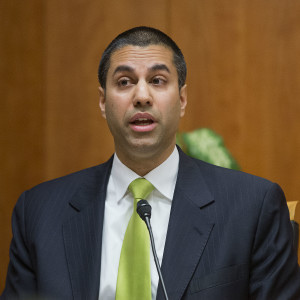One of the most prominent groups among Washington’s net neutrality lobby released a video Wednesday that aims to pit President Donald Trump and other Republican leaders against the FCC, one day before it votes to deregulate an important part of the broadband market.
Public Knowledge (PK), whose founder and former president helped the FCC pass net neutrality rules in 2015, posted the YouTube video that compiles a number of anti-monopoly statements by Trump, House Speaker Paul Ryan and others ahead of an FCC vote to deregulate the business broadband market.
Supporters of the FCC plan argue that deregulation will bring increased investment in broadband by providers. Critics, including PK, describe the market, which provides high-capacity service to businesses, hospitals, libraries, schools, public safety offices, ATM networks, and wireless carriers, as highly concentrated. According to more than a decade of FCC data, 73 percent of the business data services (BDS) market is only served by one provider and 97 percent served by only one or two.
Republican FCC Chairman Ajit Pai wants to pare down regulations that require large providers like AT&T and Verizon to lease portions of their networks to small competitors like Sprint and Level 3 at regulated rates. If adopted during the agency’s open meeting Thursday, Pai’s order would deregulate BDS markets with one competitor “nearby” or within “a half mile,” meaning only two and in some cases one provider would meet the agency’s bar for competition.
In response, PK’s video cites the anti-monopoly statements of the most powerful Republicans in Washington, and warns allowing the order to go through will bring business broadband competition down to the level of health insurance companies and passenger airlines.
“AT&T is buying Time Warner and thus CNN, a deal we will not approve,” Trump says in video from last year’s presidential campaign trail. “It’s too much concentration of power in the hands of too few.”
It goes on to show Trump blasting laws that prevent insurance carriers from competing across state lines, which he described as “essentially monopolies.”
“With more choices you have more competition, and with more competition you have lower prices,” Ryan says in a clip pulled from Republicans fight to repeal and replace Obamacare last month. “Having a monopoly isn’t a choice — it’s a monopoly. People are down to one choice, and in some cases no choice. That’s not good.”
Another compares the deregulation to the airline market, stating “airlines were allowed to merge” alongside video of the recent highly publicized forced removal of a passenger from a United Airlines flight. “Look where that got us,” reads the next line.
“High speed fiber with multiple carriers so you’ll be able to bring your cost of broadband down with more choices,” White House adviser and Trump son-in-law Jared Kushner says in another.
The video goes on to accuse Pai’s FCC of “supporting monopolies” and “defending duopolies.”
“The simplest way to provide affordable access to the basic needs of American families is through a competitive free market,” PK Vice President Chris Lewis said Wednesday. “House Speaker Paul Ryan makes this point about healthcare and it is definitely true about the basic communications network of the 21st century: high-speed broadband.”
According to the Internet Innovation Alliance (IIA), a pro-deregulation policy group whose members include AT&T, the market is “highly competitive.” Figures released by the group show BDS services by cable providers are growing at a rate of 20 percent annually while $23 billion of the total $45 billion in BDS revenue in 2013 went to small providers.
IIA says 75 percent of all buildings served solely by a large provider are within less than 500 feet of competitive fiber, 50 percent are within 88 feet and 25 percent within 17 feet.
“That’s why the FCC should encourage them to invest, build and connect America’s businesses to these modern networks rather than relying on antiquated, government-mandated special access services,” the group said.
The Computer & Communications Industry Association, which represents Silicon Valley giants like Facebook and Google, counters the distance measurements don’t take into account “the realities of the marketplace where a competitor faces high costs to extend that fiber to the building.”
During a PK-hosted conference call Tuesday the group said FCC data like those cited by IIA don’t take into account recent buyouts of small providers by large. Verizon’s purchase of XO Communications, Windstream’s acquisition of Earthlink, and CenturyLink’s pending bid to buy Level 3 will further consolidate the market, they argue.

